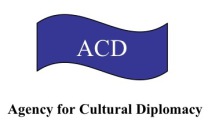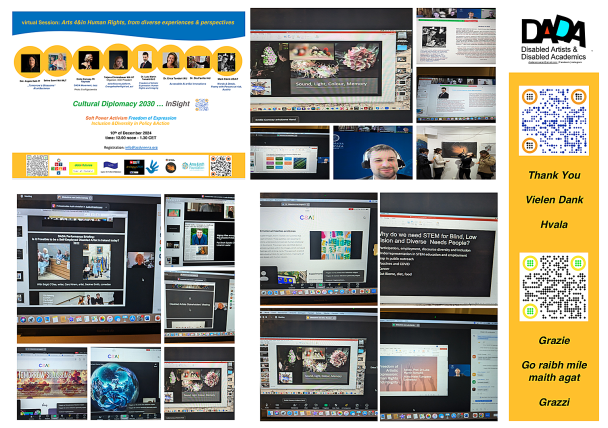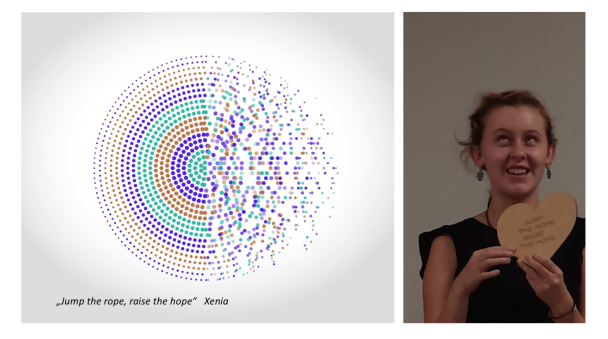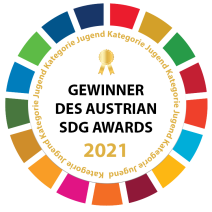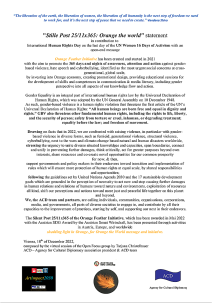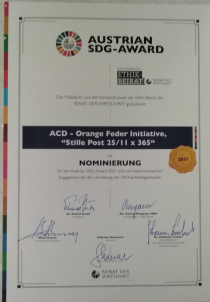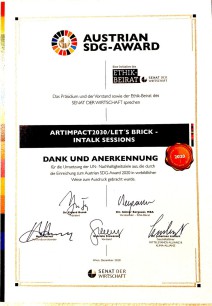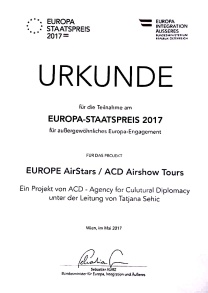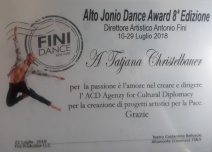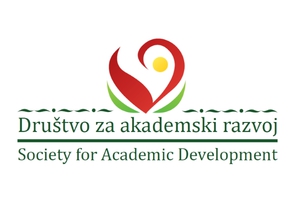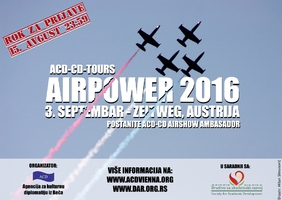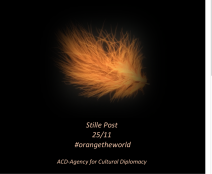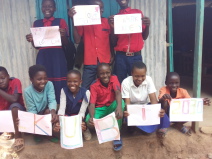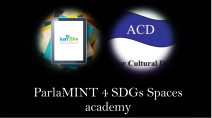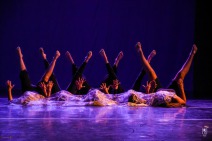
Inclusion &Diversity in Policy &Action:
Arts_Health_Wellbeing
on the World Health Day
7th - 8th of April 2025
Vienna,
live streaming
inSight
Agenda flipbook
virtual Session
Cultural Diplomacy 2030 …
Soft Power Activism, Freedom of Expression,
Inclusion&Diversity in Policy & Action
10th of December 2024
time: 12.00 noon - 1.30 CET
Focus:
Intercultural dialogue on Human Rights Activism; Freedom of expression on the intersection of arts, science, new media & policy;
AI-assistive tools, networks, and campaigns
Keynote:
Ms. Emilie Conway
a vocal jazz artist from Ireland, a founding artist of the DADA movement[1]
Presentations:
Dr. Erica Tandori,
art_scientists /AU, Monash University
& Dr Stu Favilla, Swinburne University
Selina Scerry MA & Dot. Angelo Dalli
"Tomorrow´s Blossoms" fine arts, AI /It, /MLT
Mark Klenk
Words&Deeds, PEN Austria: "Poetry with Writers at Risk" US/AT
Tatjana Christelbauer MA /ACD, AT
organizer, moderator
"Orange Feather alert" thought experiment
Keynote
Dr. Luka Martin Tomažič /SLO
Freedom of Artistic Expression: Human Rights and Integrity
inTalk with attendees:
Networks and Campaigns of personnel with disabilities of the UN organizations and civil society
About
This year´s meeting in contribution to the UN Women Campaign #orangetheworld and the 16 Action Days for eliminating violence against women takes part as in the previous years, on International Human Rights Day, 10th December.
Initiated and hosted by the Austrian-based international association ACD-Agency for Cultural Diplomacy whose team advocates for and promotes Human Rights with a sustainable, inclusive approach to relational cultures in communication, and the freedom of expression through arts as a form of cultural diplomacy at the interface with science and policy, the program explores the intersection of art, activism, and new media technology as transformative tools for advancing human rights, with a particular focus on diversity and inclusive approach in arts, science, media, and at cross-sectoral scale, for more just and accessible learning environments, tools for communication and life quality. The event aims to foster dialogue on the role of artistic freedom, soft power activism, and new media technologies in addressing global injustices, promoting intercultural understanding, and enabling marginalized voices to contribute to global conversations.
The 2030 Agenda for Sustainable Development sets out a vision for sustainable development grounded in International Human Rights standards. It puts equality and non-discrimination at the center of its efforts and encompasses not only economic and social rights but also civil, political, and cultural rights and the right to development.
However, injustices still flourish, and activist movements worldwide still call for governments, companies, and individuals to be held accountable. Human rights activism stands as a beacon of hope and progress in the realm of global citizenship and social justice.
The arts can play a pivotal role in fostering intercultural understanding and creating platforms for diverse actors to collaborate on shared goals.
Art as a form of cultural diplomacy for promoting and advancing human rights, has historically relevant evidence. Artists worldwide are engaged in promoting human rights and addressing human rights violations, spreading awareness about political, social, and environmental concerns, advocating for inclusivity, and challenging discriminatory practices through arts and cultural expressions. Unlike traditional forms of activism that may rely on confrontation or coercion, Soft Power Activism enables "deep sensorial impact from a distance" through diverse forms of arts and cultural expressions. It can foster a sense of solidarity, and collective action, mobilize communities, and empower marginalized groups by providing a platform for their voices.
New media technologies and AI can serve as supporting tools for soft power activism, by enhancing accessibility, facilitating the exchange of information and opinions, and empowering diverse communities to participate in global conversations about justice, equity, and sustainability.
How are human rights violations experienced by artists nowadays?
How is Human Rights Activism practiced by artists with disabilities, in particular persons with visual impairment?
How is freedom of artistic expression experienced by people with disabilities and what role can play new media technologies and AI to foster accessibility and visibility, engagement, and participation in global dialogues?
What role can AI and new media technologies play in the empowerment and inclusion of persons with disabilities?
Multilateral collaboration: What supporting networks and initiatives are established and how are the engaged leaders and teams supported by the local/national/international entities?
By reflecting on the ethical dimensions of artistic expression and the potential of AI and digital tools, this gathering seeks to inspire collaborative networks, innovative practices, and actionable solutions toward justice, equity, and dignity for all.
Thinking, understanding, and practicing the artistic freedom of expression, within an ethical framework emphasizes social responsibility and the prevention of harm, ensuring that expressions uphold dignity and authenticity, and avoiding exploitation or perpetuation of stereotypes.
When freedom is exercised as a moral practice, it seeks not only self-expression but also the empowerment of others, fostering a culture of respect, solidarity, and shared humanity. This approach aligns artistic freedom with the broader principles of justice and human rights advocacy.
Cordial Welcome to all distinguished presenters & guests,
Vienna, 4th of December,
Tatjana Christelbauer
Registration until the 9th of December 2024: info@acdvienna.org
Note: inSight 10/12
Participants: Participation is open to art professionals engaged in Human Rights Activism, governmental & diplomatic officials, academics, journalists, as well as all interested.
Context:
Grounded in the ACD-concept of Cultural Diplomacy2030, while underlining the importance of the inclusive engagement of diverse actors at a cross-generational scale, and including the gender perspective & cultural diversity as the most relevant in the compliance process toward a more just and peaceful world & life with & within, the hosting organizer of the meeting, ACD-Agency for Cultural Diplomacy opens new space for dialogues and collaboration, while connecting their established action platforms, such as the artImpact2030 and the dots4futures, both aimed in promoting art-based practices on the interface with science and policy, with the European and Global inclusive approach, perceiving and protecting the Human Rights and the Freedom of Expression within the ethical frame of the UN Agenda2030. In the realm of global citizenship and social justice, Human Rights Activism seeks to uphold the fundamental freedoms and dignity of all individuals worldwide, and
stands as a beacon of hope and progress.
The EU is committed to supporting and promoting culture as an essential contribution to human rights and a key element of good governance, inclusion, and sustainable growth.´
As UNESCO notes, "Culture should not be considered as a policy domain in isolation, but rather as a cross-cutting dimension that may foster a paradigm shift to renew policymaking towards an inclusive, people-centered, and context-relevant approach."
UNESCO's Re|Shaping Policies for Creativity report highlights the potential of art-based methods to create mutual understanding and advance global partnerships.
In its broadest sense, cultural diversity encompasses not only different cultural backgrounds but also diverse abilities, experiences, needs, and interests.
Multilateral partnerships and global Networks & new media technologies for good:
UNESCO emphasizes the need to leverage AI ethically in cultural contexts, ensuring equitable access and representation in line with the 2030 Agenda for Sustainable Development. Policies stress the role of inclusive digital platforms in fostering global dialogue. UN and EU strategies on cultural diplomacy stress the importance of empowering CSOs to connect diverse communities.
UNESCO policy lab: “Various movements, including those seeking gender, climate, and economic justice need to coalesce to pressure for eco-social welfare (Jones and O’Donnell, 2018). At every level, whether in ideas, language, or imagination, collective mobilization, and inclusive participation are needed to build our transformative power.´
The international community acknowledged the role of culture as an enabler and driver of sustainable development at MONDIACULT 2022 convened by UNESCO, the largest world conference devoted to culture. For the first time, culture was recognized as a “global public good”. States called for culture to be included “as a specific objective in its own right” among the next United Nations Sustainable Development Goals.
Inclusive, diversity-aware policy & its implementation:
Inclusive thinking and practice at cross-sectoral and cross-policy scales recognize diversity awareness as a foundational principle for fostering a just and equitable society. Ensuring accessibility and creating opportunities for engagement that transcend social, economic, physical, or mental barriers are essential to building cohesive, inclusive communities where everyone can thrive.
Freedom of expression
through art is a cornerstone of cultural policy promoted by UNESCO and the European Union, emphasizing its role in fostering diversity and inclusion.
UNESCO’s programs, such as the Convention on the Protection and Promotion of the Diversity of Cultural Expressions, advocate for artistic freedom as essential to pluralism and intercultural dialogue. Similarly, the EU supports initiatives like Creative Europe, which funds projects that celebrate diverse voices and ensure equitable participation in cultural life. Together, these frameworks protect artists’ rights while promoting creativity as a means to bridge cultural divides and enhance mutual understanding.
Artistic freedom of expression and human rights activism intersect as powerful tools for amplifying marginalized voices, including those of individuals with disabilities, such as the visually impaired. Art enables these voices to challenge societal barriers and reimagine inclusion, transforming public perceptions and fostering empathy, but also advocate for the rights of diverse individuals to access and contribute to cultural life.
However, thinking, understanding, and practicing the artistic freedom of expression, within an ethical framework emphasizes social responsibility and the prevention of harm, ensuring that expressions uphold dignity and authenticity, and avoiding exploitation or perpetuation of stereotypes.
When freedom is exercised as a moral practice, it seeks not only self-expression but also the empowerment of others, fostering a culture of respect, solidarity, and shared humanity.
This approach aligns artistic freedom with the broader principles of justice and human rights advocacy. Policy papers, cultures, arts, and media converge in the vital space where talk inspires action and collective visions become reality. These frameworks, while instrumental, gain meaning through the people who engage with them—writers, artists, policymakers, activists, and audiences.
“Cultures don´t meet, people do”[2] let´s meet
[1] Weblink webpage: https://www.emilieconway.ie/dada-campaign-for-human-rights
[2] Quoted Dr. Edwin Hoffmann from “Diversity Competence. Cultures don´t meet, people do” https://www.zvab.com/9781789242409/Diversity-Competence-Cultures-Meet-People-1789242401/plp
Videos from the practice of our Distinguished Speakers:
Xenia Zeiler, ACD-Agency for Cultural Diplomacy Youth Ambassador for the platform dots4futures presenting the Motto of the ACD-team created by Tatjana Christelbauer during the ERASMUS+ project LeMOON
